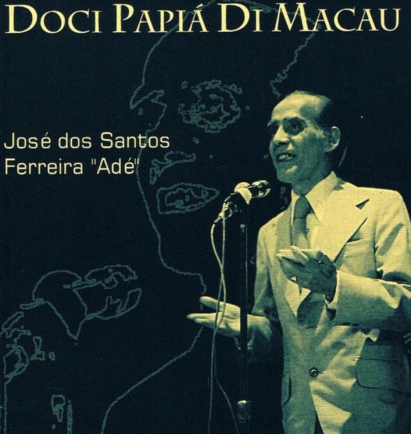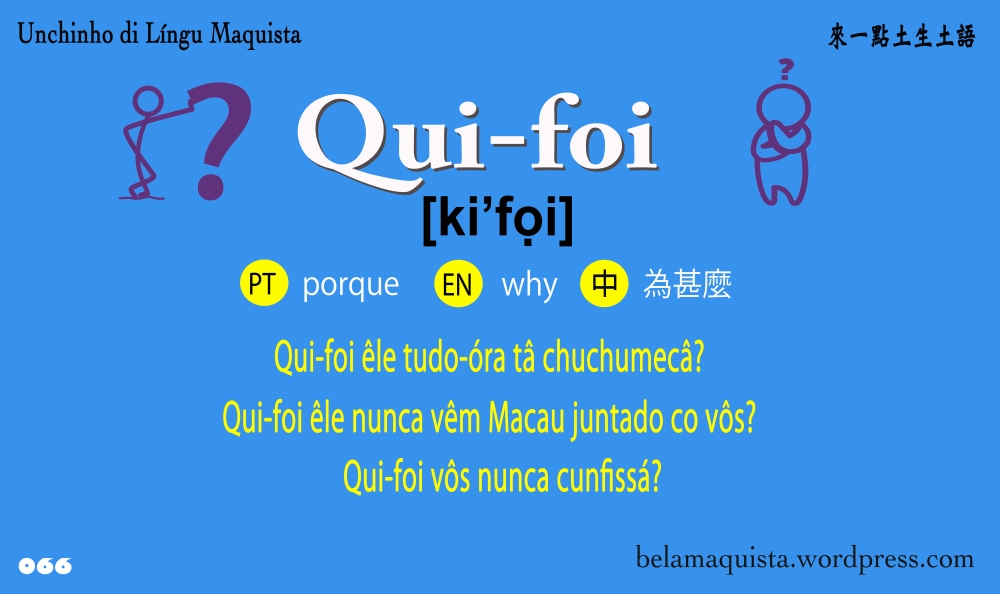阿德百年誕辰 Centennial birthday of Adé – José dos Santos Ferreira
* pls loop down for English content
 如果您對土生土語有興趣,有一個人物您是不可不知的,這就是阿德 Adé (若瑟·山度士·飛利拉)。一百年前的1919年7月28日,阿德生於澳門。他的父親是來自葡國的葡人,而母親則為世代的澳門土生。他的家庭不富裕,最終他唸到小學五年級便要拙學,但這無礙他成為土生土語文學中的影響深遠的靈魂人物。他透過不同的文學載體保育土生土語,創作的十八本著作包括了詩詞、歌曲、輕歌劇、散文等。除了在報章定期以土生土語撰寫文章外,在1985至1993年其間,他亦定期透過澳門電台朗讀土生土語作品。阿德的著作以詼諧風趣為主,也有一些描寫澳門文化習俗的文章,當中更不乏表達鍾愛澳門情懷的作品。他亦是將土生土語系統化的人,他透過文字書寫,將口語為主的土生土語編制成較為有規範的寫法,包括較一致的文法、串寫等。
如果您對土生土語有興趣,有一個人物您是不可不知的,這就是阿德 Adé (若瑟·山度士·飛利拉)。一百年前的1919年7月28日,阿德生於澳門。他的父親是來自葡國的葡人,而母親則為世代的澳門土生。他的家庭不富裕,最終他唸到小學五年級便要拙學,但這無礙他成為土生土語文學中的影響深遠的靈魂人物。他透過不同的文學載體保育土生土語,創作的十八本著作包括了詩詞、歌曲、輕歌劇、散文等。除了在報章定期以土生土語撰寫文章外,在1985至1993年其間,他亦定期透過澳門電台朗讀土生土語作品。阿德的著作以詼諧風趣為主,也有一些描寫澳門文化習俗的文章,當中更不乏表達鍾愛澳門情懷的作品。他亦是將土生土語系統化的人,他透過文字書寫,將口語為主的土生土語編制成較為有規範的寫法,包括較一致的文法、串寫等。
他是土生土語話劇團創團的靈魂人物,因為他的逝世促使大家對土生土語保育的覺醒。當時被譽為最後一位土生土語文學作家的阿德,喚醒了土生社群對屬於澳門的語言的珍惜和重視。此劇團亦以他的其中一個著作 “Dóci Papiaçám di Macau” (澳門甜美的語言)而命名,也是土生社群對他的一種尊敬和追憶。
來一點土生土語將由今天起至7月28日期間,不定期分享阿德的作品作致敬。對土生土語有興趣的您,記得大家密切留意了。
下方附上他其中一段文學作品 Unde ta vai, quirida? (親愛的,妳到哪裡去了?)。附上簡單的翻譯以便各位理解,亦有他親自朗讀的語音連結供大家一起回味這甜美的語言。
 If you are interested in the Macanese language – Patuá, you must know who Adé (José dos Santos Ferreira) is. A century ago in 28th, July 1919, Adé was born in Macau. Born to a Portuguese father from Europe and a Macanese mother, Adé came from a underprivileged family that impeded his studies at an early age. Yet, this did not stop him from becoming an indispensable figure of Patuá literature. He preserved Patuá via various types of literary works, including poetry, songs, light operas, short stories, etc. Aside from publishing Patuá works periodically in newspapers, he also recited Patuá works in Macau Radio station between 1985 to 1993. Adé’s work were primarily comedy, aiming to provoke laughter and nostalgia, with various pieces dedicated to customs and traditions of Macau. His works also included those that expresses his deep sentiments and love for his homeland, Macau. Adé was also a pioneer of structuring Patuá language through writing in a consistent manner as well as ‘purifying’ the spellings of Patuá vocabularies from standard Portuguese according to the creole’s intonations.
If you are interested in the Macanese language – Patuá, you must know who Adé (José dos Santos Ferreira) is. A century ago in 28th, July 1919, Adé was born in Macau. Born to a Portuguese father from Europe and a Macanese mother, Adé came from a underprivileged family that impeded his studies at an early age. Yet, this did not stop him from becoming an indispensable figure of Patuá literature. He preserved Patuá via various types of literary works, including poetry, songs, light operas, short stories, etc. Aside from publishing Patuá works periodically in newspapers, he also recited Patuá works in Macau Radio station between 1985 to 1993. Adé’s work were primarily comedy, aiming to provoke laughter and nostalgia, with various pieces dedicated to customs and traditions of Macau. His works also included those that expresses his deep sentiments and love for his homeland, Macau. Adé was also a pioneer of structuring Patuá language through writing in a consistent manner as well as ‘purifying’ the spellings of Patuá vocabularies from standard Portuguese according to the creole’s intonations.
He is also the soul of Patuá theatre group, as his death triggered the awakening of Patuá preservation. Known at his time as the last Patuá writer, Adé summoned the community’s attention and appreciation to their own language. The theatre group was named after one of his literary works Dóci Papiaçám di Macau as a way to honor his work and contribution to Macanese literary culture.
Unchinho di Língu Maquista will be presenting various pieces of Ade’s work this month as a tribute for his effort and contribution to preserving our sweet language. Stay tuned!
Here is one of his works Unde ta vai, quirida? (Where are you going, my dear?), with translation for better understanding. The link shared embedds Adé’s recital of his own work, feel free to listen and enjoy the sweet language of Macau.
Únde ta vai, quirida? 親愛的,妳到哪裡去了? Where are you going, my dear?
(José dos Santos Ferreira [阿德])
Macau di nôsso coraçám
心中澳門
Macau in our hearts
Alma di nôsso vida,
我們的靈魂,
Our soul,
Únde vôs ta vai, quirida,
親愛的,妳到哪裡去了?
Where are you, my dear?
Assi metido na iscuridám?
為何妳暗藏一角?
Why are you hiding in the dark?
Qui di candia pa lumiá vôs?
照亮妳的油燈在哪裡?
Where is the oil lamp that illuminates you?
Quelê-môdo vôs pôde andá?
這樣妳將如何走下去?
How are you going to continue your path?
Cuidado, nom-mestê tropeçá!
小心點,不要絆倒了!
Be careful, don’t stumble!
Vôs cai, nôs cai juntado co vôs.
妳倒下的話,我們也將跟著倒下。
If you fall down, we will fall down with you.
Macau di rôsto tristónho,
哀傷的澳門,
Macau with a sad face,
Únde têm vôsso alegria?
妳的歡樂到哪裡去了?
Where have your cheerful spirit gone to?
Quim já suprá vôsso candia,
是誰把妳的油燈吹滅了,
Who blew out your oil lamp,
Largá vôs na treva medónho?
丟下了在可怕的黑暗?
Leaving you in the dreadful darkness?
Ventania fórti ta zuní,
強風嗡嗡作響,
Storm winds approaches with its loud whistles,
Tempo ta fazê coraçám esfriado;
把心也冷卻了;
Freezing our hearts.
Na fugám, fôgo apagado,
火爐的火也被熄滅了
The fire at the heater extinguished,
Amôr tamêm pôde escapulí.
連愛意也可以逃脫。
Even love could escape.
Nom-têm calôr, nom-têm luz,
沒有溫暖,沒有光茫,
Deprived of warmth and light,
Mâz fé sã nom-podê faltá.
但不能失去了希望。
But never let our hopes go.
Dios Misericordioso lôgo achá
仁慈的天主很快便會派出
Merciful Lord will send
Unga Cirinéu pa vôsso cruz!
古利奈人承擔妳的十字架!
A Cyrenian to carry your cross!
